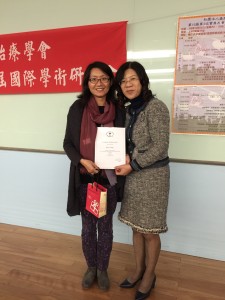On December 11th—13th, 2015, the Taiwan Occupational Therapy Association (TOTA) hosted the 1st International Conference of Evidence Based Practice in Taipei. Fengyi Kuo, LIH Olivia’s Place Occupational Therapist and an international expert in disaster recovery, was invited to be one of its keynote speakers to discuss post-disaster psychological rehabilitation services in support of TOTA and the Taiwan Ministry of Health and Welfare’s national effort in responding to the critical physical and mental health needs of burn survivors injured by the Formosa Water Park explosion. The explosion happened in the hot evening hours of June 27th, 2015 in New Taipei City when hundreds of teens and young adults cheerfully gathered in the water park for what was supposed to be a fun and entertaining “Color Play Asia” event.
The explosion, apparently caused by flammable cornstarch powder that was sprayed over the crowd, left five hundred injured, with more than two hundred severely burned. Burn patients who were seriously injured endured dozens of surgeries within the first month. The surgeries were not cosmetic, but rather saved patients’ lives by removing dead skin before it could become infected and cause sepsis. Each surgery was a tremendous challenge, requiring careful choreography just to transport each patient to the operating room, which had to be heated to 85 degrees Fahrenheit to keep the body warm. Burned skin was cut off and replaced with temporary grafts of pig or cadaver skin, each lasting for only a few weeks. Depending on the body surface burned, the skin from the few places that had not been burned would be allowed to regrow, and be then harvested again and again. Many of the patients had inhaled the flammable powder, which also damaged their respiratory tract and internal organs.
Six months after what has been called the most serious accident in the history of Taiwan outdoor events, the burn survivors’ rehabilitation journey may have just began. This is a painful and at times unbearable journey of recovery that often causes major depression and suicidal thoughts among burn survivors. Passionate about community-based program development and evaluation, Fengyi was able to share her professional experience in post-disaster recovery at the conference and discuss the importance of addressing mental health needs of the survivors through burn rehabilitation.
Fengyi maintains several advanced certifications, including Certified Psychiatric Rehabilitation Practitioner (CPRP) presented by the US Psychiatric Rehabilitation Association, and Global Mental Health Trauma and Recovery awarded by Harvard Program in Refugee Trauma Certificate awarded by the Harvard Program in Refugee trauma (HPRT) and the Harvard Division of Continuing Medical Education.





